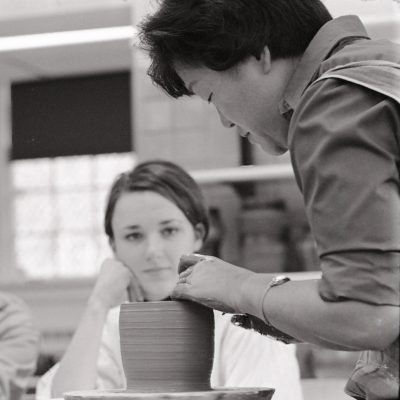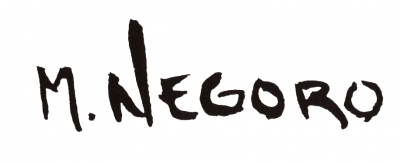January 21 - July 27, 2025
Before becoming an award-winning ceramicist and the founder of the UConn ceramics program, in spring 1942, Minnie Negoro was a young college senior at UCLA on the verge of her college graduation. Over the course of six days, her life turned upside down.
As the U.S. forcibly removed and incarcerated 120,000 Japanese Americans from the WestCoast, Negoro and her parents were sent first to Tanforan Assembly Center. They journeyed by train under armed guard to Heart Mountain, Wyoming that August. Hired as one of six employees of the Heart Mountain Ceramics Plant, the former art major learned to use a potter’s wheel as part of a short-lived venture to manufacture tableware for the other U.S. concentration camps and the army.Her training at Heart Mountain kicked off a prolific, decades-long career that took Negoro to Alfred University’s ceramics MFA program and a two-decade-long professional and teaching career at UConn’s School of Fine Arts. Her work has been shown and collected in many internationally-renowned and locally-treasured arts and ceramics collections including the Smithsonian, the Museum of ModernArt,Walker Art Center, Greenwich House Pottery, the Lyman Allyn Art Museum—and, of course, the Benton Museum, which hosted her retrospective in 1992. As UConn colleague and a fellow artist Anthony Terenzio wrote in the exhibition catalog,“her uncommon sense of form and command of craft are fused into a seamless unity.”
Celebrating the 60th anniversary of the UConn ceramics program, this exhibition features privately-owned, rarely exhibited original works on loan from Negoro’s friends and former students. UConn professors and guest curators Hana Maruyama (History & Social andCritical Inquiry) and Jason Chang (History & Social and Critical Inquiry) challenge audiences to reflect on the politics of art through the story of a seminal yet under-recognized potter in the American Studio Ceramics movement.
Public Programs:
Thursday, January 30, 4:30 – 6:30pm: Opening Reception
Wednesday, February 12, 4:30 – 6pm, Art Building, Room 109
Denise Pelletier, Artist Talk. Denise was a student of Minnie Negoro
Friday, February 21, 5 – 6:30pm
Exhibition Walkthrough with Hana Maruyama a curator of the exhibition.
Friday, March 7, 2:30 – 5pm
Art + Feminism Wikipedia Edit-a-Thon Help build out the Wikipedia page for Minnie Negoro
Friday, March 28, 12:30 – 1:30pm
Art Encounters: Standing in Solidarity Join Benton educators for an interactive two-part workshop exploring the history of Japanese American prison camps in the U.S. during World War II.
Wednesday, April 9, 12:30 – 1:30pm
Exhibition Walkthrough with artist Mara Gillen Beckwith, a friend of Minnie Negoro.

Courtesy of UConn Archives and Special Collections.
